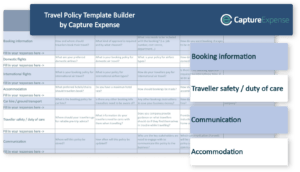A travel expense policy is more than just a list of what your employees can or can’t spend money on, while on the road.
With the right policy you can simplify your travel and expenses (T&E) reimbursement process, streamline workflows, and set clear spending limits. These are just some of the ways a robust policy can help. The list goes on and on.
If you’re new to the T&E game, you’re in good hands. We’ll provide you with a clear description of what a travel expense policy is, our guidelines to bear in mind when creating a policy, and our free template to help you get started.
What is a travel expense policy?
A travel expense policy is a set of guidelines established by an organisation to regulate and manage costs incurred by employees during business-related travel. There’s no one-size-fits-all policy, because it needs to align with your organisation’s size, needs, and travel history. But a thorough T&E policy outlines:
Booking guidelines
- Instructions on how, where, and when to book travel.
- Approved travel management platforms or expense management apps that can handle travel expenses.
- List of preferred suppliers for travel and accommodation.
Expense coverage
- Clear identification of reimbursable expenses (e.g., transportation, meals, and accommodation).
- Specification of non-deductible expenses (to avoid confusion later down the line).
Spending limits
- Maximum allowable amounts for various expense categories, such as daily meal allowances or hotel rates.
Reimbursement process
- Step-by-step instructions for submitting expense claims, including required documentation (receipts, travel log etc.).
- Expected timelines for reimbursement.
Payment methods
- Guidance on using corporate cards, cash advances, and out-of-pocket expenses.
Approval process
- Details of the approval hierarchy for travel requests and out-of-policy bookings.
Is there anything missing from your travel expense policy?
If you think your travel expense policy is missing something, then it probably is.
Ask yourself the following questions (and update your policy if you need to):
- Are there specific times when business travel isn’t allowed, such as during an audit or public holidays?
- What steps will be taken to deal with non-compliance with the policy?
- What guidelines should be in place if someone wants to extend their business trip for personal leave?
- How will the team handle unexpected events, like Acts of God or emergencies? Do employees know who to contact for help?
- Who’s responsible for keeping the travel policy up to date? How often should it be reviewed?

Get the latest insights and product updates, direct to your inbox.
Not sure whether you need a travel expense policy?
From the moment you authorise your first business trip, you’ll need a travel expense policy. You should’ve had one in place before that first trip was even booked—but you get the idea.
Ultimately, the choice is yours. However, after hearing countless stories of business trip mishaps, we’ve concluded that when it comes to travel expenses, what can go wrong, will probably go wrong.
Here are just some of the things you expose yourself to when you don’t have a travel expense policy:
- Overspending due to hidden costs that slip through the cracks.
- Late or incomplete expense claims, when employees aren’t clear on the guidelines—or forget to follow them.
- An increase in fraudulent claims, including duplications, exaggerations, and misreporting of expenses, which can go unnoticed without clear rules in place.
- A lack of insights into your company’s spending trends, since without a standard way of tracking and storing expenses, it’s hard to analyse and control your costs effectively.
5 guidelines to keep in mind when creating your travel expense policy
1. Involve key stakeholders
Your travel expense policy will touch nearly every employee and department within your organisation. That’s why it’s important to bring different perspectives and expertise to the table from the very beginning.
You need to make sure you get input from your:
- Finance teams: as they’ll make sure the policy aligns with your budget and compliance requirements.
- HR department: they can provide insight into employee needs and expectations.
- Travel department: they can highlight logistical challenges and suggest practical solutions.
2. Consider employee satisfaction
At the end of the day, your employees are the ones who will be following your travel expense policy. If the policy feels too restrictive or confusing, it can lead to frustration, delays in submitting expenses, and lower morale.
A policy that takes your employees’ needs into account—like allowing some flexibility for reasonable expenses—shows that you value their comfort and judgment.
Don’t forget, happy employees are more likely to stick to the rules.
3. Incorporate an understanding of duty of care
Duty of care is all about looking out for your employees’ safety and well-being while they’re travelling for work.
Business trips can come with unexpected risks—flight cancellations, unsafe accommodations, or emergencies—and your travel and expenses policy should reflect that you’re prepared to support your employees when it matters most.
A good policy should give clear advice on anticipating, preventing, and responding to potential issues that might arise while employees are on the move.
The goal is to minimise risks by recognising and preparing for them in advance. And if something does go wrong, your policy will outline practical solutions to manage the situation.
4. Provide easily accessibly resources
A well-crafted policy goes beyond listing the dos and don’ts. You should consider including the following resources:
- The policy document: a clear, detailed copy of the travel and expenses policy, ideally available in both digital and printable formats for easy reference.
- Expense claim forms: standardised forms for submitting expenses, whether in digital or printable formats, along with instructions on how to fill them out.
- Reimbursement process overview: a step-by-step guide explaining how to submit claims, what documentation is required, and how long reimbursements typically take.
- Approved vendor list: a list of preferred airlines, hotels, car rental companies, and other vendors.
- Contact information: details of who to reach out to with questions or for assistance, such as the finance or travel management team.
- Training materials: videos, presentations, or workshops explaining the policy and providing examples of how to follow it correctly.
- Expense tracking tools: links or instructions for accessing company-approved expense management software for tracking expenses during trips.
- Policy updates notifications: a process or platform where employees can check for updates to the policy to make sure they’re always informed of the latest guidelines.
5. Practice continuous improvement
Regularly updating and improving your travel and expense policy is crucial because things change—whether it’s new technologies, shifts in industry standards, or changes in your company’s needs.
By keeping your travel & expense policy up to date, you can make sure it stays relevant and effective.
Plus, it gives you the chance to address any issues that have come up, refine areas that might be causing confusion, and adapt to new challenges.
Capture Expense is here to support you every step of the way
We know that creating a travel policy from scratch takes time, and it can be overwhelming at first. To help you get started you can download our free travel expense policy template.
Or, if you want to see how we can streamline your entire T&E process, book a demo here.

Travel Expense Policy Builder
From flights and accommodation to duty of care and communication—this policy builder template will help you outline all the key areas you need to include in your travel expense policy!

